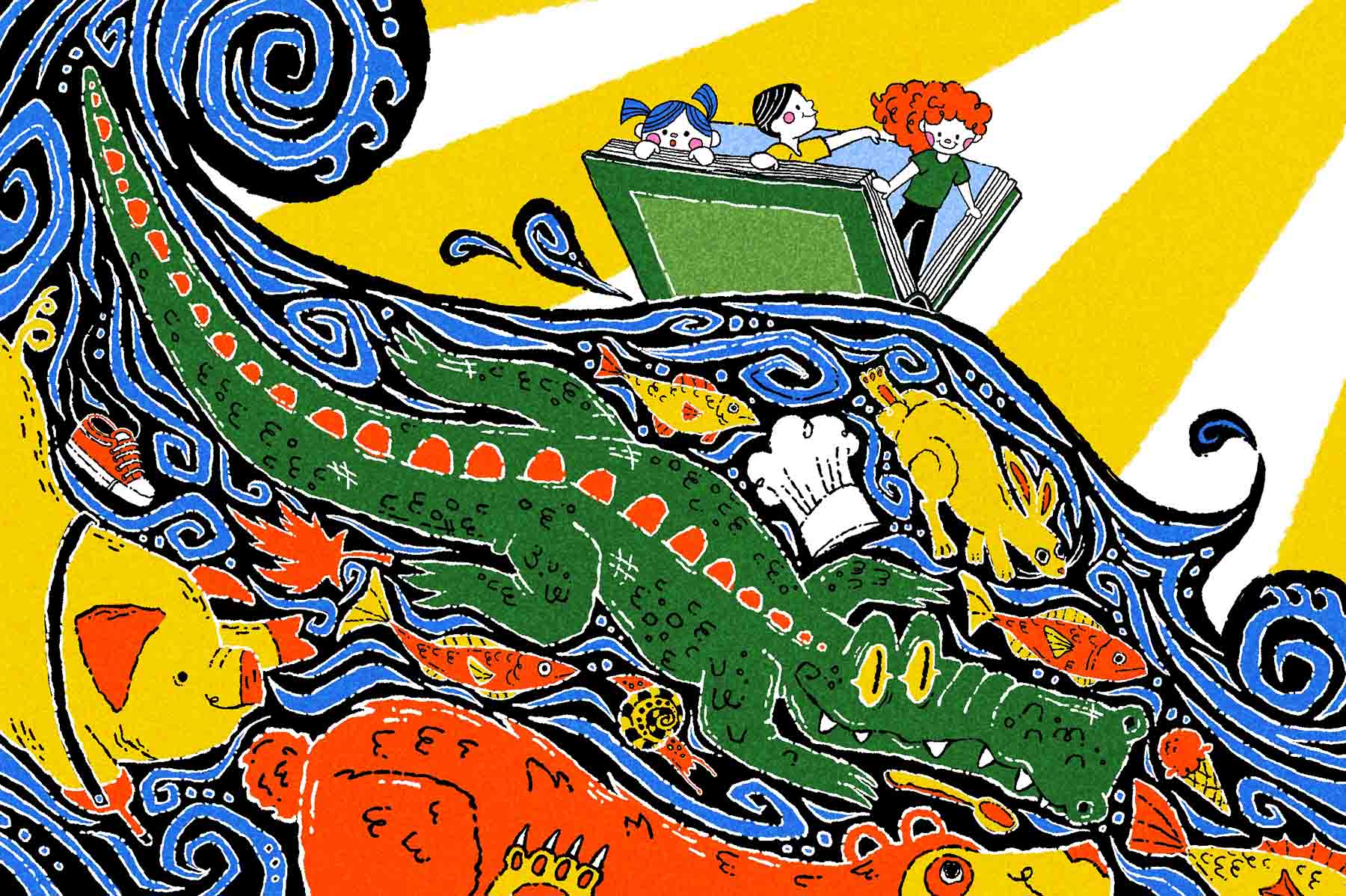As a parent of three children, I have spent nearly two decades reading children’s poetry. So I can say with some confidence that, by and large, the stuff is terrible. Marred by incompetent metre and bad rhymes (when it bothers to rhyme at all), most children’s poetry is disposable, written to fill the space next to an illustration. This is unfortunate. Children react to catchy rhythms, clapping their hands and stamping their feet even if they don’t yet understand the meaning of the words. A physical response to sound can ignite interest in poetry as an art form. It takes a special writer to understand that.
Cue Dennis Lee. In an effort to introduce “zing, bounce, vitality into traditional kids’ poetry,” Lee wrote Alligator Pie, a book of silly, joyful, charming nursery rhymes that is today a landmark of Canadian literature. Started when he wanted bedtime poems for his little girl but couldn’t think of any suitable ones, Alligator Pie has reportedly sold over half a million copies since its publication in 1974 and cemented Lee’s reputation as “Canada’s Father Goose.” Lee went on to write other popular kids’ books—indeed, he’s a prolific, celebrated former poet laureate of Toronto whose collections include the Governor General’s Literary Award–winning Civil Elegies. But Alligator Pie pulled off a feat realized by few authors: it has lasted. My father read it to me countless times at bedtime, and I bought my family copy shortly after my first child was born, a “collector’s edition” released in 2001 (alas, it is too tattered now to interest any collector).
This year marks Alligator Pie’s fiftieth anniversary. The reason for its longevity is simple: it tunes young ears to the music of language. Full of jaunty linguistic sallies—the title poem blasts open with: “Alligator Pie, Alligator Pie, / If I don’t get some I think I’m gonna die!”—Lee’s book is one of the few that can actually inspire a lifelong love of poetry. And shouldn’t that be the goal of children’s verse?
Children are far more of a target audience now than when I was young. Look around the kids’ section at any large bookstore and you’ll see categories like “Board Books,” “Baby’s First Book,” and “Early Readers.” Those shelves are filled mostly with titles designed to instruct children on the importance of some virtue, such as co-operation or generosity. Heavy-handed in their language, they’re contemporary iterations of the “moral” stories Lewis Carroll satirized over 150 years ago in Alice’s Adventures in Wonderland. This combination of bad verse pushing grown-up views leads to what Lee calls “pious versicles.”
But young children are the most vicious literary critics, because they have no respect for the idea that they should like something. They recognize attempts to push approved ideas on them for what they are: a waste of time. (As John Keats says, “We hate poetry that has a palpable design upon us.”) The poems in Alligator Pie, by contrast, don’t try to be nice or to convey sentiments that the author thinks children ought to agree with. Instead, they participate in the full spectrum of the child’s world, such as anger, resentment, even cruelty. “When I write,” Lee said in 1977, “I really just try to get in touch with one of the many kids in myself because I think all adults have a variety of children bouncing up and down in their system.” That creative process led Lee toward whimsy, as in “Skyscraper,” which is based around a literalist perspective characteristic of children:
Skyscraper, skyscraper,
Scrape me some sky:
Tickle the sun
While the stars go by.
Tickle the stars
While the sun’s climbing high,
Then skyscraper, skyscraper
Scrape me some sky.
The musicality and the running, dactylic feel of the extra unstressed syllables give this poem a headlong rush (“You can almost hear the skipping rope slapping on the sidewalks,” Margaret Laurence said about Lee’s book). But our early years also have grim, chaotic corners, and Lee’s poetry isn’t shy about dipping into the darker elements of children’s behaviour:
Tony Baloney is fibbing again—
Look at him wiggle and try to pretend.
Tony Baloney is telling a lie:
Phony old Tony Baloney, goodbye!
In these hypersensitive times, this poem—quoted here in its entirety—could be regarded as an example of bullying, in which poor Tony is mocked as he tries (and fails) to lie convincingly. But children relate to the feeling of being provoked by another child who is a known liar, and they delight in his humiliation. Young readers will make the poem’s fury their own. The natural goodness of the child is one of the greatest lies propounded by children’s literature. Didn’t many of us have schoolyard rivals we secretly hated for one reason or another? By including poems that express these feelings, Alligator Pie conjures a candid, complex, and well-rounded portrait of a child’s emotional life. Lee even channels the nightmare world that, for kids, hovers around the edges of reality. A poem like “In Kamloops,” excerpted below, is terrifying:
In the Gatineaus
I’ll eat your toes.
In Napanee
I’ll eat your knee.
In Winnipeg
I’ll eat your leg.
In Crysler’s Farm
I’ll eat your arm.
The poem is coupled with a psychedelically tinged illustration, by Frank Newfeld, of an unshaven man in a chef’s hat holding a long knife in one hand as he steps out from behind a shelving unit filled with various severed body parts. It’s hard to imagine it could be published today.
I introduced Lee’s poems to my son in the middle of another nightmare: the COVID-19 pandemic. Because my strongest recollection of these poems is of my own father, an engineer, reading them to me when I was small, the book trails an aura of parental protection. I wanted to surround my son with that same feeling of safety.
My father discovered Alligator Pie in a happier time. Following the surge of patriotism that characterized the centenary of Confederation and Expo 67, Canada was in the middle of a nationalist cultural project. The Canada Council for the Arts had been established in 1957, and the 1960s had seen a flourishing of homegrown publishing that established what we now think of as CanLit. Alligator Pie was arguably the first attempt to extend the dream of CanLit into children’s poetry. An obvious aspect of the book’s nationalism is the way Lee, in adapting the nursery rhyme form, Canadianizes the content:
William Lyon Mackenzie King
Sat in the middle & played with string
And he loved his mother like anything—
William Lyon Mackenzie King.
I would have had no idea who William Lyon Mackenzie King was when I first heard the poem, though I loved the fact that his name sounded like “lion.” I didn’t know anything about the title character in A. A. Milne’s “King John’s Christmas” either—poems by the Winnie-the-Pooh author were another bedtime favourite—but placing historical figures in a children’s poem makes an implicit statement that they matter, as if to say, “You don’t know who this is yet, but you’ll learn.” Lee’s book insists that Canadian prime ministers belong right next to English kings and queens.
In the same way, Lee’s insistent, almost incantatory use of domestic landmarks and place names—Casa Loma, Kamloops, Winnipeg, Charlottetown—tells children that the places around them are just as worthy of being memorialized in poetry as better-known, foreign landmarks like London Bridge or the bells of St. Clement’s. By fitting these place names into patterns of rhyme and metre, Lee both emphasizes and elevates the beauty of their sounds. A poem like “Kashe or Chicoutimi” begs to be read out loud:
If I lived in Temagami,
Temiskaming, Kenagami,
Or Lynx, or Michipicoten Sound
I wouldn’t stir the whole year round
Unless I went to spend the day
At Bawk, or Nottawasaga Bay,
Or Missinabi, Moosonee,
Or Kashe or Chicoutimi.
The poem approaches the abstraction of music. It has very little discursive meaning; instead, it focuses on the cadence of the marvellous-sounding names, creating an expansive, echoing map of Canada that is born in the ear and lives in the mind.
Children have a native recognition of poetic quality. Every parent knows the signs of inattention that show while reading a bad book—the complaining, the squirming, the low-level whining. Parents also know the rapt stillness of bewitched children. Alligator Pie holds their attention in a way that arhythmic, moralizing drivel never will.
That’s why the book is a keeper. An astute use of Canadian references, along with the ability to capture the intricate texture of a child’s inner world, turned Alligator Pie into something new generations can pore over with pleasure. But describing the book in those terms might risk praising Lee’s own “pious” design on children. The truth is that I kept—and keep—reaching for Alligator Pie because of how superbly written it is (Lee said it took him anywhere from forty to sixty drafts to get a poem right)—the Ookpik, for example, is “nothing but hair. / If you shave him, he isn’t there” or the dad “got snarky and barked at the shark / Who was parking the ark on the mark in the dark.” Just try reciting this stanza in a monotone:
My little sister’s sitter
Got a cutter from the baker,
And she baked a little fritter
From a pat of bitter butter.
First she bought a butter beater
Just to beat the butter better,
And she beat the bit of butter
With the beater that she bought.
You can’t; the lines are so daft, rollicking, and exuberant, they defeat the most concentrated attempts to make them dull. That quality is what I believe drew my father, uninterested in poetry as he generally was, back to Alligator Pie, night after night. We sat on the floor, leaning against my bed, as the words—broadcast in his tired voice—formed an orchestral bubble of song and imagery around us. In reading Alligator Pie to my son, I wanted us to re-enter that world, one where he might feel himself grow up, as I did, inside the genius of Lee’s poetry.




